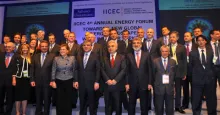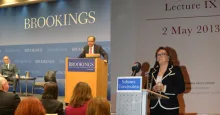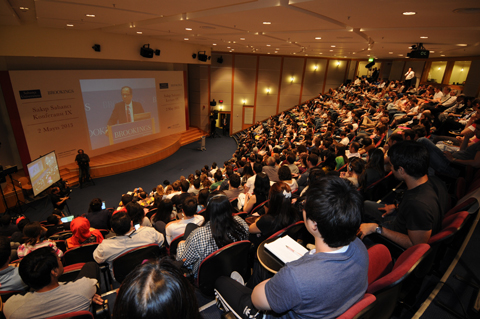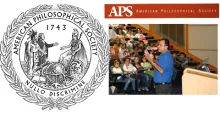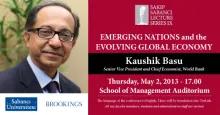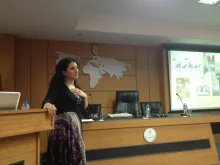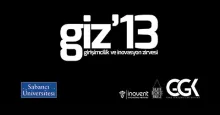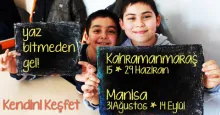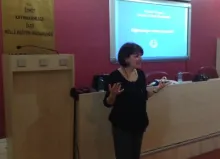13/05/2013
Global energy leaders gather at Sabancı University IICEC
Hosted by Sabancı University IICEC, the leaders of the global energy scene discuss “Towards a New Global Energy Landscape : What Role for Turkey?”
President of the Republic Abdullah Gül: “Turkey’s greatest contribution to the EU may be in the area of energy. We would like to see this issue handled with priority in EU chapters. EU remains strategically shortsighted in this matter.”
The fourth Annual International Energy Forum of the Sabancı University Istanbul International Center for Energy and Climate began with the attendance of President of the Republic of Turkey, Abdullah Gül.

Many foreign state dignitaries, representatives of the leading global energy companies and members of the most distinguished universities, policy centers and think-tanks of the world take part in the forum on “Towards a New Global Energy Landscape : What Role for Turkey?”
The forum is hosted by Sabancı University Board of Trustees Chair Güler Sabancı and the Honorary Chair of the IICEC Steering Committee, Dr. Fatih Birol and will be a platform for discussing and analyzing international energy markets. Introductory remarks were made by Güler Sabancı, Fatih Birol and President Abdullan Gül.
Sabancı University Board of Trustees Chair Güler Sabancı: “Sabancı University IICEC is a global center for global energy policies.”

Sabancı University Board of Trustees Chair Güler Sabancı remarked: “We envisioned a globally recognized center, Sabancı University Istanbul International Center for Energy and Climate (IICEC), in Turkey, to contribute to energy and climate related strategies. Our motivation when starting with this idea has very concrete bases. International energy production and consumption is shifting towards developing countries. Turkey’s role and importance in the global energy landscape is growing. And Istanbul, this magnificent city, is where global energy connects. We decided to form IICEC in Istanbul, at the strategic location connecting not only the continents, but also the ideas to shape a better energy future, regionally, and globally.”
Honorary Chair of the IICEC Steering Committee Dr. Fatih Birol said, “Since two-thirds of the existing gas contracts in Europe and Turkey will expire within the next 10 years, buying countries will have the opportunity to renegotiate with sellers.” Birol continued, “The shale gas revolution in particular could lead to contracts at lower costs. This is of great importance for countries like Turkey, which are import-dependent for energy, because the new contracts to be signed in five years will have terms of 30 to 40 years, and if these countries were to take the right steps at this stage, they will import energy for less and reduce their budget deficits.”
Dr. Fatih Birol: “Strategic formulas for energy-importing nations”
Fatih Birol explained that the natural gas reserves in Russia, the Caspian Basin, Iraq, Iran, other Middle Eastern countries and the Eastern Mediterranean accounted for seventy percent of global gas reserves, and that more importantly, the production costs of gas and petroleum at many of these reserves would be considerably lower than the global average. To illustrate his point, Birol said that the cost of gas produced in northern Iraq was even lower than that of the gas in the United States. Fatih Birol concluded that Turkey’s energy decisions in the near future could make significant contributions to the growth of the national economy and be of paramount importance for regional security of supply.
President of the Republic Abdullah Gül said, “Turkey’s greatest contribution to the EU may be in the area of energy. We would like to see this issue handled with priority in EU chapters. EU remains strategically shortsighted in this matter. While hydrocarbon resources are important for the medium-term, R&D support for renewable energies is a requirement. The President continued, “The utilization of domestic resources has reduced import dependency in Turkey. New projects are being developed on this subject, and Turkey has come a long way in security of supply.”

About IICEC
IICEC is a future-oriented independent research and policy center designed to conduct objective, high-quality economic and policy studies in energy and climate. IICEC efforts will help the development of solutions to a sustainable energy future for the region and the world.
Working with governments, partners from industry, international organizations, think-tanks and other research bodies, establishing a network of cooperation with other universities in the region and in the world; IICEC aims to inform policy makers, industry, academics and opinion leaders on key energy challenges and provide them with objective and genuine analysis. We foster the exchange and development of ideas by providing a distinguished platform gathering key stakeholders involved in energy and climate fields.
The decision to form the Istanbul International Centre for Energy and Climate was motivated by the growing role of Turkey in the international energy landscape and the strategic position of Istanbul, where Europe and Asia meets.

